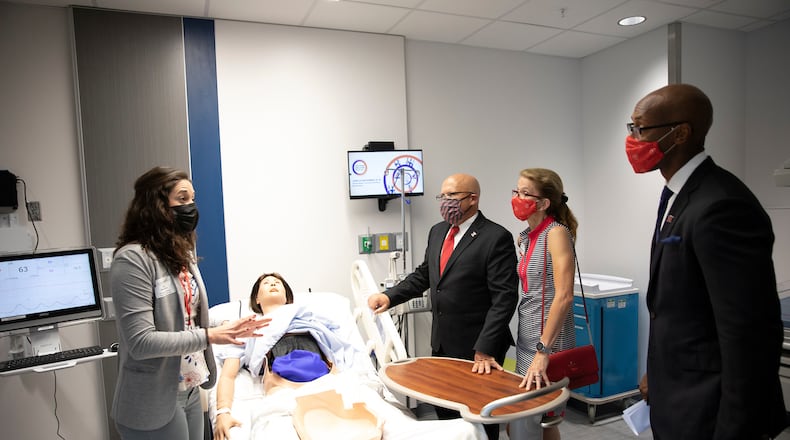The Nursing Innovation Hub features two state-of-the-art units with 10 hospital beds and four simulation center rooms that will give students a simulated experience with multiple patients and the opportunity to practice skills such as prioritization and delegation, Miami officials said.
“I believe that in this day and age, we simply can’t over-prepare our nurses. So, from a skills and confidence-building standpoint, lab and simulation resources are vital,” said Brooke Flinders, chair and associate professor of Miami’s department of nursing.
“Students now have completely up-to-date facilities and equipment available to them, so they can become more comfortable with their assessments and their skills in a safe environment,” she said, adding the second phase of renovation is scheduled to be done in 2022.
All nursing students from Miami’s other campuses – in Oxford and Middletown – will have access to learn and train in the Nursing Innovation Hub.
“We have simulation spaces representing an OB suite, a pediatric suite, a medical surgical suite, and an ICU suite. We also have a simulated apartment so students can learn key principles related to home care and safety measures,” said Flinders.
The ongoing pandemic has hit hospitals and other health-care facilities hard with medical nurses often on the front lines of patient care. Even before the COVID-19 virus’ onset in March 2020, the health care industry, in Butler County and nationally, needed more nurses.
Sara Arter, assistant professor in nursing at Miami, said the nurse training facility will provide “training for the next generation of nurses who will make up a large portion of the workforce caring for the residents of Butler County.”
“One of the most pressing issues in nursing education today is that new graduate nurses are not prepared for nursing practice. There are a lot of reasons for this, but one primary reason is that students do not have enough opportunity to practice the hands-on skills and concurrent critical thinking required to be ready for nursing,” said Arter.
“The expanded simulation space will allow students the ability to practice the skills and critical thinking vital to effectively take care of real patients.”
Moreover, said Arter, “we are also training health care providers for a future of unknowns.”
“With an aging population, epidemics ranging from infectious disease to opioids to obesity, health care policy that seems to shift daily, and rapid expansion of tele-health and health care technologies, our students must be ready for everything,” she said.
About the Author

